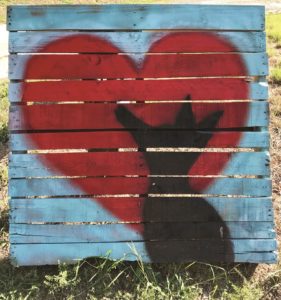“See you Friday night at Sangha!” Hugh said to me on the way out the door. I looked at the schedule on the back of my manual and sure enough: Sangha would be at 5:30 p.m. I was new at the Institute and did not for the life of me know what that meant. My yoga practice had always been deeply individual. I might find myself positioned alongside others in studios, but I was on my own.
Sangha translates as “community” or “assembly of peers.” Friday night Sangha gatherings at the Nosara Yoga Institute were an opportunity to share, to coordinate, to solve problems. Fellow students told stories of why they were there, and there were shout-outs as people told how others had helped them that week. I was deeply uncomfortable. I had thought this whole healing thing was a solo undertaking.
But this kind of assembly is by now something I’ve come back to again and again, especially in crisis. It looks different outside the yoga world. Sometimes it’s even digital. I’ve joined in GoFundMe campaigns that bring people together. In an era where personal medical bankruptcy is high on the list of reasons why people become homeless in the U.S., that’s one thing that calls me to Sangha, or to look for the helpers, as Mr. Rogers might put it.
I’m also seeing Sangha in the reawakening of the practice of mutual aid. A neighbor asked if I wanted to start an account together to order produce from J&E. A favorite café, Fox and Crow, blossomed into a philanthropic side hustle, the Common Table, to feed those who are stuck physically or financially because of the pandemic. I loved those breakfasts, delivered during a stretch when I was unemployed, quarantining, and lonely. After neighbors dropped off home-cooked meals, I was later able to do the same, all of us feeling a bit closer and cozier as a result.
Researchers call our connections to others our “social capital.” It’s in our daily interactions with community members and our ties to acquaintances that build trust, support, and communication. Retired people often talk about the ways their social capital declines. Not because they want it to. But it’s inevitable, without work colleagues, with families spread far and wide, that social circles get smaller. Researchers don’t usually call this practicing Sangha, but they do say if we can keep our social capital strong, we’ll be healthier.
Epidemiologist Yvonne Michael from the Drexel University School of Public Health has been studying social capital in seniors. She found that those with higher social capital tend to be more physically active, healthier, and happier.
With Covid-19 keeping us apart, all of us, regardless of age, are now confronting an accelerated loss of social capital. Where traditional gatherings are unsafe, knocking on a neighbor’s door for sugar is a no-go, and large-scale community projects are put on hold, we have all been innovating. And the outlook seems to be that we’ll have to keep innovating for months to come.
I suggest we all embrace a very broad version of Sangha. It’s not a yoga pose. Nor does it have to cost anything or exist online.

Wellfleet’s collective howl at 7:30 p.m. is lately my mainstay practice of Sangha. My neighbor Andy started it up during lockdown as a ’Fleetian way to honor health-care workers. Other towns banged pots and pans. In Wellfleet, we howled like wolves.
Every night that I’m home, 7:30 on the dot brings the first loud and lingering howl from Andy and his family. I step outside and yip and howl my loudest. Up the hill, new-ish neighbors have joined in. I’ve begun recognizing certain houses based on their rendition of a howl. On quiet nights, I can hear the howls from surrounding neighborhoods joining in. A cathartic and slightly silly call and response. A reminder that we’re not alone. And, it turns out, a way to stay healthy.



